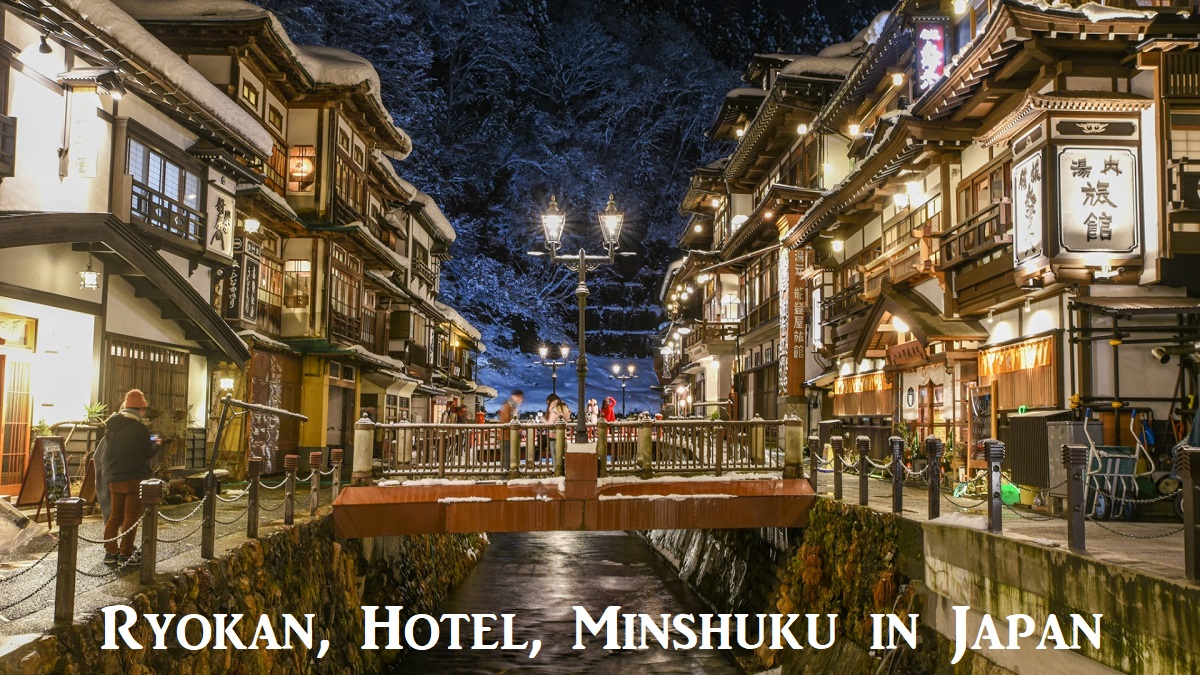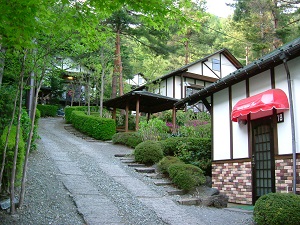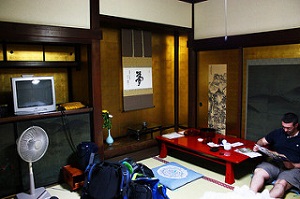Accommodation in Japan
Ryokan - Traditional Japanese Inn
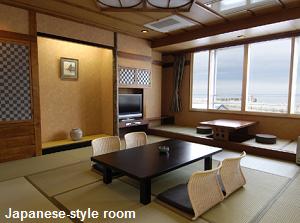
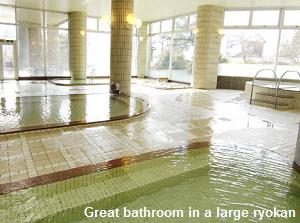
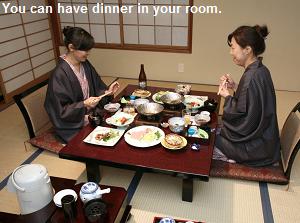
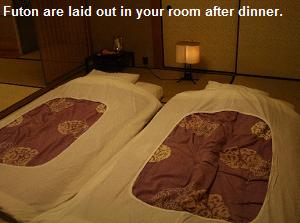
Photo by @JNTO
"Ryokan" is a Japanese-style inn, and it is the common accommodation in Japan.
Basically the room is tatami-floored.
("Tatami" is a traditional Japanese mat used as a flooring material, and is made using rice straw with a covering of woven soft rush straw.)
Therefore, you have to take off your shoes and go into the room.
Most ryokans have communal bathrooms.
Especially major ryokans have great bathrooms with bathtubs like a pool.
Many of the ryokans also have a small bathroom in each guest room.
Most ryokans provide "yukata" to wear in the ryokan.
Yukata is a thin cotton kimono.
In addition, "haori" like a jacket is provided when you feel cold.
(But, don't take them home as souvenirs!)
Commonly, one dinner and one breakfast are served for one night's lodging.
You can enjoy your meals in your room or at the restaurant in the ryokan. That depends on the system of ryokan.
The dinner is mainly "Kaiseki cuisine". Various Japanese dishes are served one after another.
Of course, you can order some drinks at extra.
In the morning, traditional Japanese breakfast is served, but some ryokans adopt buffet style as a breakfast.
After the dinner, some attendants move the table aside and lay out futon (Japanese traditional bedding) in your room.
Your room changes from a guest room to a bedroom.
In any ryokan, while the dinner is held in a restaurant, a few attendants enter your room to lay out futon during your dinner.
Of course, they aren't thieves.
Trust has been built up between Japanese people and any ryokan, so no Japanese guest complains about that.
In any ryokan, an attendant lady serves the lodging needs of you.
She carries your luggages, takes you to your room, and gives you the presentation of the lodging in the ryokan.
She is like a waitress for your room.
Hotel
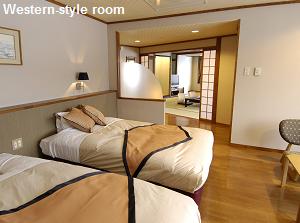
"Hotel" is maybe the accommodation which you know well.
It has the rooms with one or two beds and a bathroom.
Also the big hotels in sightseeing area have many Japanese rooms and a big bathroom like ryokan.
Generally, the hotel have a few restaurants and the hotel guests enjoy dinner and breakfast there.
"Business Hotel" (Budget hotel)
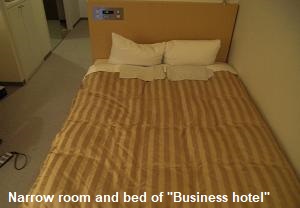
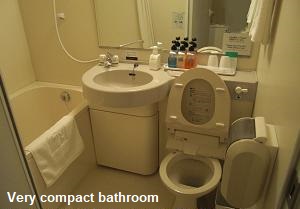
In addition to such big hotels for tourists, there are the hotels which have the small rooms with only a bed and a bathroom for business people.
It is a kind of "budget hotel", and it is called as "business hotel" in Japan. And "city hotel" is sometimes used as English translation.
It is mainly located in the center of city or around railway station.
Most of them have no restaurant.
The lodging fee is cheap.
If you are a normal traveler, it is a good way to use such hotel.
Because, the hotel is located at very convenitent place.
So, you can start your tour quickly next morning.
And, the hotel is a place only to sleep, and you can enjoy the favorite dinner at any restaurant in the city.
Capsule hotel
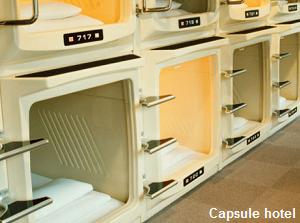
If you are a male, there are the "Capsule hotels" in a downtown area of big city.
It originated in Japan.
Many boxes are lined like a sleeping car of train.
One of the boxes is your room, and have only the space that you can lie.
A television and air conditioner are equiped.
The lodging fee is very cheap and you can check even in late at night.
So, most lodgers are businessmen who stayed late and worked overtime or missed the last train to their home.
Recently, capsule hotels for women are increasing in Tokyo, Osaka, Nagoya.
If you are a woman, it is an idea to stay in such hotel for travel on the cheap.
Love Hotel
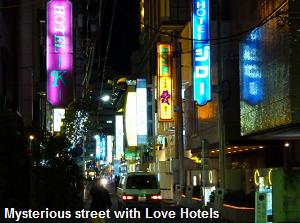
Love hotel is literally a facility that lovers use to make love.
Therefore, the hotels are located at the lonesome area a little far from downtown, or along the street to the suburbs.
The sign says "Hotel", but most of them are fancy building and the windows are small.
When you enter the hotel, you can catch the key of favorite room without being seen.
When you go out the hotel, you pay the fee by payment machine in many case.
Of course, the fee is cheaper than the normal hotel.
If you are a couple and can't find any hotel at all, using this hotel is an idea.
Minshuku
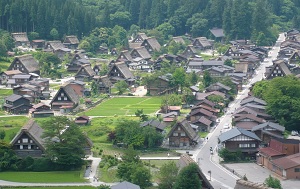
Some of traditional houses in Shirakawago are minshuku
"Minshuku" is like small ryokan.
Most minshukus are around sightseeing area, swimming beach, ski resort, hot-spring area, base area of hiking, etc.
Most of minshukus are family-run, and have only several rooms in Japanese style.
In some areas, traditional old houses are used as minshuku.
The lavatory and bathroom are generally communal.
Some minshukus have only shared rooms.
Basically one dinner and one breakfast are served for one night's lodging, and all lodger have the meals at the same time at the same dining room.
Of course, The lodging fee of minshuku is cheaper than ryokan.
The meals are not so rich as ryokan, but fresh fish and vegetables produced around there are used.
Sometimes, you have the chance that you can eat the fish which the host caught and the vegetables which the hostess harvested.
Probably you can enjoy a Japanese family atmosphere.
Pension
"Pension" means "Minshuku in Western style" in Japan.
The appearance of the house, the rooms with beds, and the menu of meals are western-style.
Like minshuku, one dinner and one breakfast are served for one night's lodging, and all lodger have the meals at the same time at the same dining room.
Most of pensions are around seaside, lakeside or hill resorts.
Pension of Western style is more sophistcated for Japanese people than minshuku of Japanese style.
So it is popular with young ladies and young families.
The lodging fee of pension is cheaper than ryokan, but is slightly more expensive than minshuku.
Guest house
If you request an accommodation which is very cheap and have only a bed, that is "Guest house".
Guest house is increasing in Japan, and most guest houses are for foreign or Japanese backpackers.
The lodging fee of guest house is maybe about half of "business hotel". And the room is relatively comfortable.
Basically common Japanese travellers except backpackers don't select this accommodation, so Japanese people know little about this information.
If you want to use this, you should check the information in advance.
Youth hostel
Youth hostel is the cheap accommodation originated in Germany for young people.
In Japan, there are about 130 youth hostels now in the main cities and around sightseeing areas.
The rooms, baths and lavatories are basically shared with the boys and girls separated.
Formerly, the lodgers had to do the preparation of dishes, the wash of dishes after your meal, the cleanup in your room and so on, for educational purposes.
But the style of travel has changed and the use of hostels has decreased in recent decades, so you need not do them in most hostels today.
Recently you can drink.
In many hostels, the manager help the meeting in the evening for guide of sightseeing or deepening the friendship of the lodgers.
In a sense, I think youth hostel is similar to guest house.
It is an idea that you considar youth hostel as a guest house.
Shukubou
Shukubou is the accommodation in Buddhist temple.
Originally it was the accommodation for ascetic monks, and then it became the accommodation for pilgrims in Edo period (17-19th centuries).
But, even if you aren't a Buddhist or aren't interested in Buddhism, you can stay there.
The accommodation of shukubou is almost same as minshuku.
The waiter is a young monk, but you shouldn't request excessive service.
Because, you are in the place where Buddhist priests practice asceticism in seeking spiritual enlightenment.
Generally the meals are all vegetarian dishes.
But I hear that many shukubou recently serve fish and meat dish.
Also you can order alcohol.
You can join the ceremonies of Sutra reading for the Buddha statue in the evening and early morning. (about half or one hour)
If a Zen temple, you can experience the Zen sitting meditation. (about several ten minutes)
All temples in Japan don't have shukubou.
The famous shukubous are around Dewa 3 mountains in Tohoku district, around Zenkoji Temple in Nagano city, around Minobusan Mountain in Yamanashi prefecture, some temples in Kyoto, around Koyasan Mountain in Wakayama prefecture, many temples on the pilgrimage route in Shikoku Island, and so on.
If you want to stay a shukubou, you had better make a reservation.
The lodging fee of shukubou is slightly cheaper than minshuku.
Vacation Rentals and Homestays
These are the lodging types that you can stay with the hosts who are native Japanese people.
These are increasing now, but are not yet widely available.
Because, there were few customs that an individual or a family accetepted travelers in the home in Japan.
On the other hand, I sometimes hear that the travelers cause any trouble with nearby residents.
They made a noisy party.
They visited nearby residents to get foods and tools they needed in an impolite manner.
They threw the trash around the house...
In these cases, the host usually lends the guests the room key and only the guests stay in the house freely.
(They may misunderstand that nearby residents are hotel employees.)
In such situations, Japanese government is developing the related laws.
Japanese government hopes that more foreign travelers visit Japan.
I think the homes of vacation rentals or homestays will gradually increase.
Of course, when you stay in these houses, you should be careful not to bother the nearby residents.

